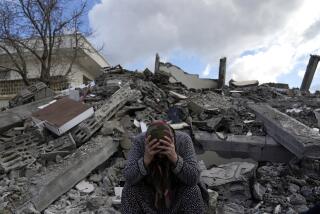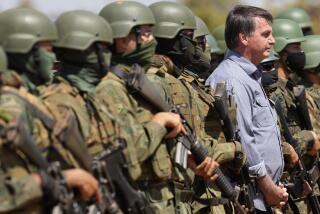Turkish Politics Must Break Free
- Share via
Despite last month’s elections, things are most likely to remain the same in Turkey for years to come. The new coalition government will be weak, with divergent ideologies and inimical relationships. Most important, the new government will remain a hostage to Turkey’s military elite as most of its counterparts have been over the past 75 years.
Since Turkey’s establishment as a republic in 1923, its bodyguards (the military) have played the king (the body politic) under one guise or another. The military overtly seized power in 1960, 1971 and 1980, and forced the Islamic Welfare Party government to resign in 1997. After forcing the Welfare government out of power, it dictated judicial proceedings that eventually banned the Welfare Party from participating in the political process.
Like the Olympian gods of the ancient Greeks, Turkey’s armed forces tell their politicians what to think. The politicians have to brief them routinely about what they think and decide. As long as the military dictation reigns supreme, no intelligent political conversation will take hold in Turkey, and its economic, social and defense problems will continue to mount and fester. Politicians will not make any decision that erodes the ideology of the Turkish military.
Kemalism, Turkey’s military ideology, is supposed to include “democracy” and “secularism” but is operationally defined as anything that is anti-Islamic. Kemalism mandates that the military topple a government that allows people to practice Islam, purge people who practice Islam from government jobs and parade tanks to choke civilian voices that ask for civil rights to practice their religion. Just this week, a woman in Muslim headdress was kept from taking her seat in Parliament.
Such policies make a farce of the democracy and secularism that the Turkish leaders profess to defend. Moreover, this discrimination has hurt Turkey’s productivity in all spheres of activity and its image as a civilized nation.
Even in the secular and predominantly Christian Western countries, Muslims are winning respect for their freedom of religious belief and practice. It is this freedom that has helped the Muslims in North America, for example, become one of its most productive communities. Muslim immigrants in the U.S. have made wonderful achievements in architecture, education, medicine, science and technology. Their counterparts in the so-called Muslim-majority countries like Turkey have been able to achieve little in comparison.
Muslims in modern Turkey should expect even better accommodation of their beliefs and practices, given the fact that Turkey is almost a 98% Muslim-majority country. Ironically, however, they are the ones who are persecuted the most.
If Turkey’s government pursues its present anti-Islamic, inhumane and ridiculous policies, Turkey will degenerate as a society, as a democracy and as a military power. Turkey will not catch up with the West or the rest of the world by inhibiting the development and contribution of a large part of its workforce.
The deleterious effect of addleheaded military intervention in Turkish politics is so pathetic that, even after pursuing Kemalism for 75 years, Turkey remains a client state of another client state (i.e., Israel) to meet its strategic and defense needs. Once a superpower, Turkey now has no strategic vision of its own and is extremely susceptible to foreign pressure.
The new leaders must review the absurdity of Turkey’s anti-Islamic policies and allow all their fellow citizens to contribute to their society. Turkish leaders must have much better things to do than engage in a medieval fight over Islamic dress or practices at the dawn of the 21st century.
To develop a strong, stable and just political order, the new leaders in Turkey must forge a unity on one common ground, and that is to liberate their political process from servitude to the military. The problems that plague Turkey orbit around the military lordship over the political process. Liberation of the political dialogue from raw military intervention must be a precondition for solving national problems and earning international respect.
More to Read
Sign up for Essential California
The most important California stories and recommendations in your inbox every morning.
You may occasionally receive promotional content from the Los Angeles Times.













